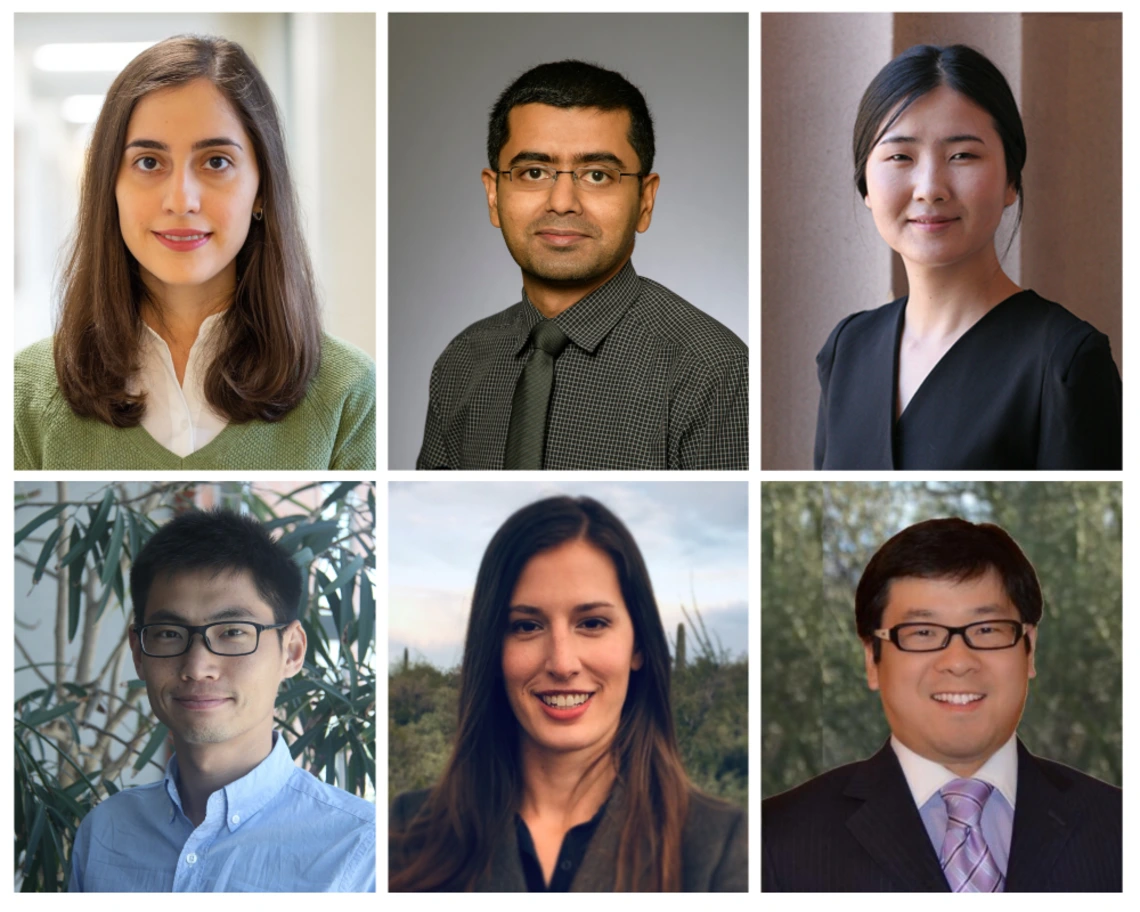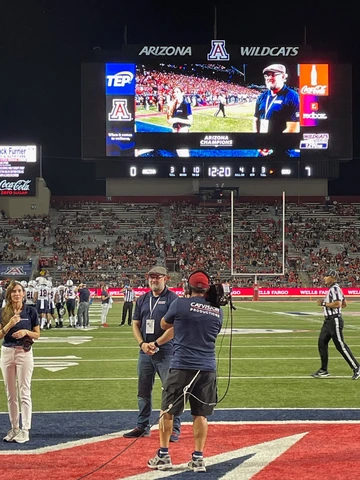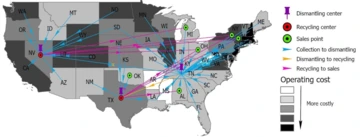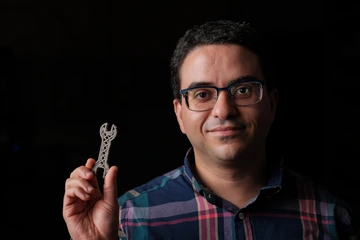Faculty Tackle Global Challenges in 2021

SIE faculty worked on both local and international scales throughout 2021. Their research resulted in awards, funding, and a better understanding of how to address problems that affect us all.
Hannah Budinoff and Mohammed Shafae, both SIE assistant professors, surveyed community-driven PPE production efforts during the pandemic. They surveyed 145 informal 3D-printing manufacturing efforts to derive lessons to improve future preparedness. Shafae says they observed short lead times for 3D printing efforts, but there were limitations such as high scrap rates, the need for frequent manual intervention, issues with part quality, and high cost per unit. To address this, he says teams should have plans in place to consider multiple manufacturing methods in the future. Additive manufacturing can meet an immediate need, followed by more efficient but still short-term production like using aluminum molds, before resuming traditional mass manufacturing. They published their results in the Journal of Manufacturing Systems.
SIE assistant professor Vignesh Subbian worked with the BIO5 Institute to better understand traumatic brain injuries, such as concussions, which result in more than 2.8 million emergency room visits per year. The research addresses various aspects of patient care and quality of life, as well as preventing the injuries altogether. Last year, Subbian also secured a seed grant from the BIO5 Institute's Technology and Research Initiative Fund to compile characteristics of hospitalized COVID-19 patients in Arizona. He has been collaborating with Dr. Jarrod Mosier, associate professor in the College of Medicine – Tucson. In addition, he was recently named the associate director for health science data and informatics at the Center of Biomedical Informatics and Biostatistics, thanks to his contributions in helping shape medical informatics activities for the center.
Assistant professor Jianqiang Cheng and Yong Ge from the Department of Management Information Systems are using a National Science Foundation award to create optimization methods for learning network data representations in information networks. Cheng is also working with Boshi Yang at Clemson University to develop conic approximations for quadratically constrained quadratic programs with the support of an Office of Naval Research grant. In addition, he and Yao-Jan Wu from the Department of Civil and Architectural Engineering and Mechanics (CAEM) re using an NITC grant to develop data-driven decision-making models and computational methods for e-scooter system design.

SIE adjunct professor Brian Cunningham was named an Arizona Champion for his work on the university’s COVID-19 Test, Trace and Treat program. Arizona Champions are faculty and staff members who go above and beyond. As director of logistics in the Office of Strategic Initiatives, Cunningham helped lead a diverse team that kept up with changing demands. Cunningham first helped supply COVID-19 tests to the community and state. He next began working with antibody research and supplied dozens of state testing sites for a statewide research study approved by the Institutional Review Board. In total, Cunningham estimates the campus conducted nearly 300,000 tests.
With a Department of Energy grant, associate professor Neng Fan is developing advanced modeling and optimization approaches that enable cascading hydroelectric systems to provide enhanced operational flexibilities. His collaborators include SIE PhD student Zhiming Zhong and partners from Stevens Institute of Technology and Portland General Electric. He continues providing his optimization expertise in to the Sustainable Bioeconomy for Arid Regions. One of his recently graduated PhD students, Daniel Zuniga, began a position as a software developer at Hexagon Mining in summer 2021.
Assistant professor Afrooz Jalilzadeh and SIE PhD student Morteza Boroun are developing efficient algorithms to solve nonconvex stochastic optimization problems to improve efficiency and scalability of machine learning algorithms. In their most recent work, they developed an inexact-proximal accelerated gradient scheme, which has been accepted for publication proceedings of the 2021 Winter Simulation Conference.
Assistant professor Hongyue Jin has been appointed as the deputy lead of crosscutting research at the Critical Materials Institute (CMI), funded by the United States Department of Energy. As part of her CMI research, she collaborated with SIE professor Jianqiang Cheng, SIE PhD students Meysam Cheramin and Apurba Kumar Saha, and professor Sanjoy Kumar Paul of the University of Technology Sydney on resilient NdFeB magnet recycling under the impacts of COVID-19 pandemic. The research has been accepted for publication in Transportation Research Part E. Read the preprint of the paper.
SIE lecturers Sherilyn Keaton, Bob Lepore, Sharon ONeal and Sam Peffers were promoted to professors of practice in fall 2021. Lepore is the director of SIE’s Engineering Management Program, and ONeal is the inaugural director of Software Engineering program, which is co-administered by SIE and the Department of Electrical and Computer Engineering.

Professor Pavlo A. Krokhmal is working with professor Sergiy Butenko from Texas A&M University to develop a network analytics toolkit, encompassing both theoretical models and computational algorithms, for analysis of complex, interconnected, heterogeneous networks. This work is funded by Air Force Office of Scientific Research grant from 2019 to 2022. In June 2021, Professors Krokhmal and Butenko co-organized the 4th International ACM Workshop on Critical Infrastructure Network Security, held in conjunction with the 2021 ACM SIGMETRICS Conference. The workshop featured invited presentations on state-of-the-art advances and challenges related to critical infrastructure networks.
Professor Wei Lin and PhD student Liang Zhang are developing interactive control strategies for roadway networks based on data directly from individual vehicles. This is as opposed to using conventional roadway surveillance systems such as loop detectors or microwave or laser sensors. They are also assessing the feasibility of establishing a testbed for testing those strategies.
Associate professor Jian Liu was elected as chair-elect of the Quality, Statistics and Reliability section of the Institute for Operations Research and the Management Sciences (INFORMS). With CAEM professor Kevin Lansey, statistics GIDP student Shenghao Xia, and SIE PhD student Yinwei Zhang, he is developing new spatio-temporal analytics for detecting bursts in water distribution systems as part of an NSF award. Their recent conference paper on “Detecting Bursts in Water Distribution System via Penalized Functional Decomposition” was awarded as runner-up for the best paper in the 2020 IEEE International Conference on Industrial Engineering and Engineering Management. Liu’s co-authored paper, “Higher-order normal approximation approach for highly reliable system assessment” received honorable mention for best paper in the 2020 IISE Transactions Focus Issue on Quality and Reliability Engineering.

Assistant professor Mohammed Shafae and his PhD student Md Habibor Rahman, along with collaborators Krishna Muralidharan, Douglas Loy and Anna Hayes from materials science and engineering, won first place at the Lockheed Martin ASCEND Propel Pitch Session. The presentation described their lunar regolith 3D printing technology, a manufacturing method that uses material from the moon’s surface to produce on-demand items – such as tools or parts for repair and refurbishment purposes.
Associate professor Qiang Zhou and associate professor Hongki Jo of CAEM are developing active battery management strategies for wireless sensor networks used to monitor the health of critical infrastructures. This work is funded by an NSF award. Zhou was also promoted to associate professor with tenure in August 2021.
Department Head Young-Jun Son gave a keynote speech at 2021 UK OR Society’s Simulation Workshop in spring 2021. In addition Son and his graduate students developed an agent-based simulation model of pedestrian dynamics for classroom-type indoor spaces. They used it to evaluate alternative policies (e.g. entrance and exit policy, seating policy, and room layout) during COVID-19. A journal paper on this work was accepted for publication in IEEE Transactions on Automation Science and Engineering. Son’s group, is also collaborating with SIE’s Vignesh Subbian and Dr. Eugene Chang and Dr. Jarrod Mosier of the College of Medicine – Tucson. The team has developed a VR-based hybrid-simulation system to provide cost effective training for physicians in endoscopic surgery and emergency airway management. Finally, Son has been serving as the senior VP of continuing education at IISE, a member of INFORMS Meetings Committee and a board member of Winter Simulation Conference.
